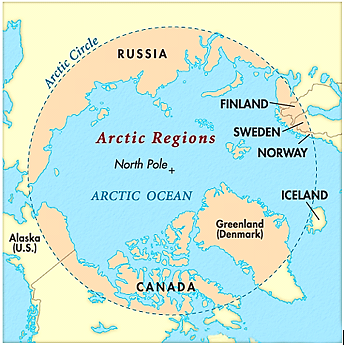Important for
Prelims: Geography and Environment
Mains: General Studies I
Arctic Sea Ice Melting
- A recent study in the Nature journal suggests that the melting of Arctic Sea ice in summer is inevitable in the coming decades.
Importance of Arctic Sea Ice
- Climate Influence:
- Arctic sea ice plays a crucial role in influencing global climate patterns.
- It reflects sunlight, helping to maintain the earth’s energy balance and cool polar regions.
- Sea ice acts as a barrier, keeping the air cool by separating cold air above from warmer water below.
- Biodiversity and Indigenous Communities:
- Economic Opportunities and Competition:
- Reduced ice cover opens shipping lanes and facilitates access to natural resources in the Arctic.
Arctic Amplification
- Arctic amplification refers to the phenomenon where changes in surface air temperature and net radiation balance produce larger effects at the poles, specifically in the Arctic region.
- It is a result of global warming caused by anthropogenic forces or human activities since pre-industrial times, leading to a 1.1-degree Celsius increase in the Earth’s average temperature.
- The primary causes of Arctic amplification include ice-albedo feedback, lapse rate feedback, water vapor feedback, and ocean heat transport.
- Diminishing sea ice in the Arctic due to global warming plays a significant role in amplifying the warming effect.

Consequences:
- Weakening of Polar Jet Streams:
- Unseasonal showers in northwest India have also been linked to this weakening.
- Melting of Ice:
- Changes in Composition of Sea Water:
- Affects Fauna:
- Gaseous Emission:
- Thawing permafrost releases carbon and methane, greenhouse gases responsible for global warming.
- It may also release long-dormant bacteria and viruses, potentially leading to disease outbreaks.
Practice Questions for Prelims
____ is India’s research centre in the Arctic.
a) Maitri
b) Dakshin Gangotri
c) Himadri
d) Bharati
Ans. c)




Leave a Reply
You must be logged in to post a comment.